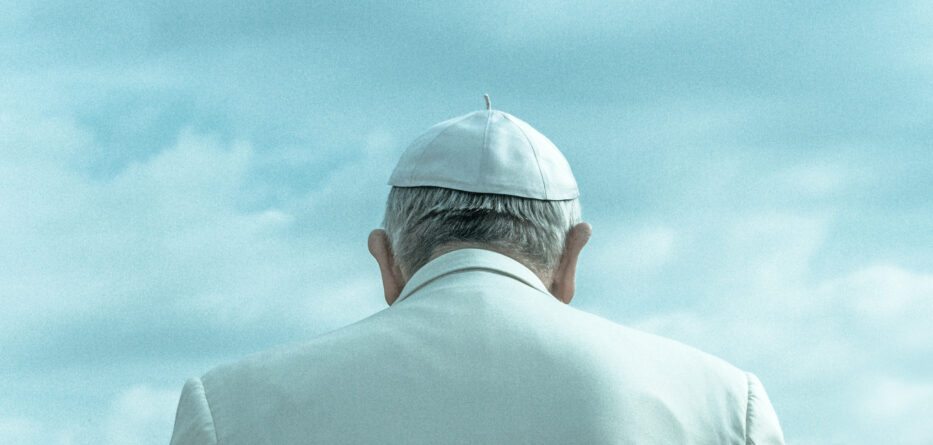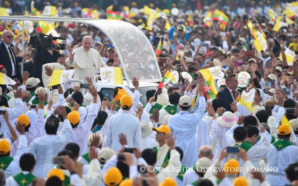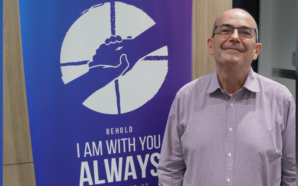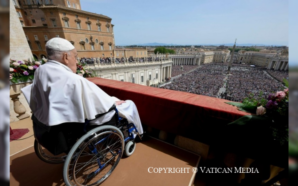It’s been said that the Holy Spirit gives the Roman Church the pope it needs for the particular time in which he’s elected. And even if one pontificate or another looks like a “catastrophe” — as a dead cardinal once bravely described the current one while hidden safely behind the cloak of anonymity –, we must also remember the words of Dame Julian of Norwich: “All shall be well.” Eventually so, anyway…
One cannot begin to understand or evaluate the pontificate of Pope Francis without stepping back and taking a broad view of the world today. Christianity is an incarnate faith and the world (and reality) as it actually is, and not as we would prefer it to be, is the setting in which must live out our faith. Jorge Mario Bergoglio, the Italian-Argentine Jesuit who became Bishop of Rome in March 2013, understands this better, it seems, than many of the men who elected him.
The world is currently going through perhaps its biggest upheaval in all of human history. We are in the midst of a tidal of wave of rapid foundational changes that are hard to keep up with. The digital revolution that began a few decades ago is nowhere near completion. And we are now just beginning to confront other dizzying technological advancements, such as in the field of artificial intelligence (AI). Our current migration “crisis” is said to be the biggest mass movement of peoples ever. And the physical state of the planet and its natural resources appears to be more precarious than in any other period.
Meanwhile, the steady implosion of the hierarchical/monarchical structure of the Christian Church, which began ever so slowly several hundred years ago, is gaining increasing momentum. Every denomination of Christianity is in deep institutional crisis. No branch springing from the trunk of the one — yet divided — Church of Christ has been spared. Surveys show consistently that people are turning away from institutional Christian religion for various reasons.
This is the world in which Francis must exercise his ministry as arguably the most identifiable and prominent Christian on earth. His plan has been to keep it simple and radically evangelical. Acutely aware that we are facing an extremely uncertain future, his message could be boiled down to this: wherever the world is heading, just make sure you take God with you. Yes, it’s that basic.
And the way to do that is by focusing on the bare essentials of our faith — Christ has died, Christ is risen and Christ will come again. The pope offers the scriptures, especially the Beatitudes that are found in the synoptic Gospels, as the guide for living that faith practically.
The evangelical pope and Christian unity
The 86-year-old pope’s singular focus on the essentials also makes him amazingly non-sectarian. That is refreshing for many people, especially non-Catholics. But it is a nightmare for others, such as those in the Roman Church who are rigidly doctrinaire and sticklers for keeping rules. All Christian denominations suffer from a certain type of sectarianism or tribalism. We are still too accepting of our divisions. We identify more with being Catholic or Anglican or Orthodox than being Christian. Francis has challenged us on that by his evangelical, non-dogmatic, welcoming and non-judgmental style of witnessing and proclaiming the person and message of Jesus Christ.
He has tellingly spoken about what he calls the “ecumenism of blood”, pointing out that today’s Christian martyrs — and there are many — are killed without regard for their denomination. The persecutors don’t ask whether they are murdering a Presbyterian or an Evangelical, he has insisted, they just know they are targeting a Christian. In this, they understand the reality of our true unity in the Christian faith better than we do. Indeed, by baptism we are already united!
Different from many of his papal predecessors, Francis has held up the leaders of other parts of the one Church as equals, not as subordinates. He has built strong relations with the Ecumenical Patriarch of Constantinople, the first-among-equals in the Orthodox hierarchy, by sharing center-stage or taking on a secondary role at jointly attended events. Francis has done the same with the Archbishop of Canterbury, and in a couple of weeks will make a joint pastoral visit to South Sudan with him and the Moderator of the Church of Scotland.
The pope has invited the ecumenical Taizé Community to arrange a large prayer vigil in St. Peter’s Square on the eve of next October’s assembly of the Synod of Bishops. Catholics and so-called Protestants will pray together just before the Catholic leaders begin deliberations on Church reforms.
Francis believes that the one Church of Christ can reestablish the unity that has been strained and fractured over the centuries by putting aside the age-old demands for uniformity and, instead, favoring diversity. We are united already in baptism, the prime sacrament that makes each one of us a Christian. It appears absurd and a scandal to many — including Francis himself, it seems — that baptized members in one part of the Church cannot share the Eucharist with those in another part.
Pure and simple, Francis is much more concerned about preaching and living the Gospel, than fussing over the theological or ideological minutiae found in some papal manuscript or Roman Curia document.
The pope’s critics, the modern-day pharisees
In all of this, the Jesuit pope has made enemies — especially among the clergy at every level. These clerics and even some laity are like the pharisees who were furious with Jesus of Nazareth because he unmasked their legalism, rigidity and hypocrisy.
Naturally, only a very few — like the psychologically unbalanced Archbishop Carlo Maria Viganò — will state clearly that they are against Francis. Others continue to play the old Roman game of never criticizing the pope, insisting always that someone else is at fault for the bad things that happen (or the ones they do not like) in a particular pontificate.
But with the recent death of Benedict XVI, some are starting to air their difference with the pope — and their dislike for him — more openly. The late pope’s longtime personal secretary, Archbishop Georg Gänswein, published a sort of tell-all book even before the sealant had dried on Benedict’s tomb. It doesn’t paint a flattering picture of Francis. And of course Cardinal George Pell, who died just a week after Benedict, blasted Francis in two lengthy screeds — one he published under pseudonym last year and the other he penned just days before his unexpected death.
Now Cardinal Gerhard Müller has given free flow to his own great lament against the Latin American pope in a book-length interview with an Italian journalist. The 75-year-old German, who is the official custodian of the collected works of Joseph Ratzinger-Benedict XVI (by the late pope’s design), is withering in his criticism of Francis.In one section the cardinal complains about the pope’s decision not to renew him in his job as prefect of Congregation for the Doctrine of the Faith (CDF) in 2017 when the German’s initial five-year term expired. Müller says it was like a flash out of the blue and left him stunned. He cites all sorts of possible reasons why Francis did not give him for another five years, including the probability that the Latin American pope does not like German theologians!
Rather than being angry at Francis for letting him go, Müller should actually be grateful to the Jesuit pope for giving him his red hat. Francis was under no obligation to do so. It was only out of respect for Benedict XVI, the one who put Müller at the helm of the doctrinal office in July 2012. Benedict (we discovered later) had already decided months earlier that he was going to resign the papacy and could have left Cardinal William Levada, who was 76, in post as CDF prefect. That would have allowed his papal successor to choose his own doctrinal chief. Benedict, instead, decided to tie the hands of the pope who would follow him.
Francis: a pope who makes mistakes
Pope Francis is not perfect, nor does he pretend to be. He has blind spots when it comes to sexual abuse, and yet… he has implemented stricter protocols to deal with offenders. He often displays chauvinistic views of women that are connected to his age and culture, and yet… he has made some historic appointments of women to Vatican posts. Then there is his rough and abrupt handling of Cardinal Angelo Becciu… And we could add other items to the list.
Certainly there are things that one can find to criticize in the current pope. But when we look at the bigger picture, he has been a great gift to the Church and to our world — especially when he insists that we’re all in the same boat and extols us to care for each other and for all of God’s creation. And when he encourages us to make sure that, wherever we are heading during these turbulent times, we take God with us.
Thanks to La Croix international where this article originally appeared.








